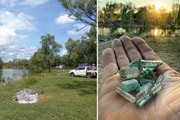You shouldn’t have to move 1,200km just to get healthcare…but this older Aussie did
By
Maan
- Replies 0
Some stay. Others leave. But for many, the decision feels like a slow heartbreak wrapped in kilometres of empty highway.
It’s a dilemma that’s becoming all too common—whether to uproot a life built over decades or gamble with worsening health just to stay home.
And for one couple in outback Queensland, that choice has come knocking far too often.
Kerry and Kathy MacDonald had always loved the rhythm of Longreach life. Quick trips to the shops often stretched into hours, filled with friendly chats and familiar faces.
‘I think we live in the best town in the country. We know all the people, there’s plenty to do,’ Kathy said.
But when Kerry’s heart condition worsened in 2020, the relaxed pace was replaced by regular, grueling trips to Brisbane—2,400 kilometres there and back.
The older he got, the harder each journey became.
‘As you get older, each trip is worse…it takes us longer. We now have to stop three times instead of driving straight through,’ Kathy said.
Eventually, Kerry was offered a place in a three-year clinical trial in the city—something that could extend his life.
It forced the couple to consider leaving their beloved home and support network behind.
Their eldest son offered them a place to stay in Brisbane. But the emotional toll of moving weighed heavily.
‘We agonised over it—we’d have to leave and virtually start another life,’ Kerry said.
Ultimately, they chose to stay in Longreach, believing the upheaval would do more harm than good.
‘It would have created so much upheaval…I feel it would have had a more detrimental effect on Kerry’s health and probably mine,’ Kathy said.
They now rely on local GPs to manage Kerry’s care.
Across rural Queensland, stories like theirs are growing more common.
Data from Queensland Health showed that in very remote areas, the median age of death was 75.2 years—compared to 81.7 years in major cities.
Those living in disadvantaged areas were also likely to die three years earlier than those in wealthier regions.
The leading causes of death included coronary heart disease and dementia.
Dr Danielle Allan, president of the Rural Doctors Association of Queensland, said many rural residents waited five to six weeks to see a GP.
‘We are actually seeing people presenting a lot later in disease progression and therefore their outcomes are nowhere near as good as if we picked it up earlier,’ she said.
She added that while more junior doctors were beginning to train in rural areas, it would take years before the benefits were felt.
‘You’re constantly moving but not necessarily feeling like you’re achieving much,’ she said.
Terri-Ann Dwyer, from Aged and Disability Advocacy Australia, said many were forced to move away for care—often at great emotional cost.
‘That has grief, loss and trauma associated with it…specially if it’s something that is forced upon somebody,’ she said.
For those no longer able to drive, the isolation is even more intense, with little or no public transport available in many remote areas.
She urged those struggling to reach out, noting long waiting lists for residential care and overwhelmed support services.
‘You’ve worked really hard all your life… it is our time now to ensure that we provide the most appropriate services and supports,’ she said.
As for the MacDonalds, they’re staying put for as long as they can—thanks to a mix of technology and community care.
Kerry now wears a medical watch that alerts Kathy—and emergency services—if he falls.
‘I get a call within 10 seconds, and then if I don’t answer it within 10 or 20 seconds it goes straight to the ambulance,’ Kathy said.
They know they may eventually need to leave. But for now, Longreach is still home.
‘We feel we don’t miss out too much.’\
Long drives and limited access aren’t the only burdens many face when seeking care from remote communities.
For some, the financial strain of travel, accommodation, and out-of-pocket fees can be just as overwhelming as the health challenges themselves.
If you’ve ever wondered how much it really costs to live far from a major hospital, this next story breaks it down.
Read more: Rural residents shell out more for health services as hidden costs emerge

Would you uproot your entire life just to stay alive longer—or stay where your heart already is?
It’s a dilemma that’s becoming all too common—whether to uproot a life built over decades or gamble with worsening health just to stay home.
And for one couple in outback Queensland, that choice has come knocking far too often.
Kerry and Kathy MacDonald had always loved the rhythm of Longreach life. Quick trips to the shops often stretched into hours, filled with friendly chats and familiar faces.
‘I think we live in the best town in the country. We know all the people, there’s plenty to do,’ Kathy said.
But when Kerry’s heart condition worsened in 2020, the relaxed pace was replaced by regular, grueling trips to Brisbane—2,400 kilometres there and back.
The older he got, the harder each journey became.
‘As you get older, each trip is worse…it takes us longer. We now have to stop three times instead of driving straight through,’ Kathy said.
Eventually, Kerry was offered a place in a three-year clinical trial in the city—something that could extend his life.
It forced the couple to consider leaving their beloved home and support network behind.
Their eldest son offered them a place to stay in Brisbane. But the emotional toll of moving weighed heavily.
‘We agonised over it—we’d have to leave and virtually start another life,’ Kerry said.
Ultimately, they chose to stay in Longreach, believing the upheaval would do more harm than good.
‘It would have created so much upheaval…I feel it would have had a more detrimental effect on Kerry’s health and probably mine,’ Kathy said.
They now rely on local GPs to manage Kerry’s care.
Across rural Queensland, stories like theirs are growing more common.
Data from Queensland Health showed that in very remote areas, the median age of death was 75.2 years—compared to 81.7 years in major cities.
Those living in disadvantaged areas were also likely to die three years earlier than those in wealthier regions.
The leading causes of death included coronary heart disease and dementia.
Dr Danielle Allan, president of the Rural Doctors Association of Queensland, said many rural residents waited five to six weeks to see a GP.
‘We are actually seeing people presenting a lot later in disease progression and therefore their outcomes are nowhere near as good as if we picked it up earlier,’ she said.
She added that while more junior doctors were beginning to train in rural areas, it would take years before the benefits were felt.
‘You’re constantly moving but not necessarily feeling like you’re achieving much,’ she said.
Terri-Ann Dwyer, from Aged and Disability Advocacy Australia, said many were forced to move away for care—often at great emotional cost.
‘That has grief, loss and trauma associated with it…specially if it’s something that is forced upon somebody,’ she said.
For those no longer able to drive, the isolation is even more intense, with little or no public transport available in many remote areas.
She urged those struggling to reach out, noting long waiting lists for residential care and overwhelmed support services.
‘You’ve worked really hard all your life… it is our time now to ensure that we provide the most appropriate services and supports,’ she said.
As for the MacDonalds, they’re staying put for as long as they can—thanks to a mix of technology and community care.
Kerry now wears a medical watch that alerts Kathy—and emergency services—if he falls.
‘I get a call within 10 seconds, and then if I don’t answer it within 10 or 20 seconds it goes straight to the ambulance,’ Kathy said.
They know they may eventually need to leave. But for now, Longreach is still home.
‘We feel we don’t miss out too much.’\
Long drives and limited access aren’t the only burdens many face when seeking care from remote communities.
For some, the financial strain of travel, accommodation, and out-of-pocket fees can be just as overwhelming as the health challenges themselves.
If you’ve ever wondered how much it really costs to live far from a major hospital, this next story breaks it down.
Read more: Rural residents shell out more for health services as hidden costs emerge
Key Takeaways
- A Longreach couple chose not to move to Brisbane for trial treatment due to emotional toll.
- Median age of death in remote areas is more than six years lower than in major cities.
- Rural residents often face long waits to see a GP, leading to late diagnoses.
- Experts warn support services are overwhelmed as demand grows across regional Queensland.
Would you uproot your entire life just to stay alive longer—or stay where your heart already is?








